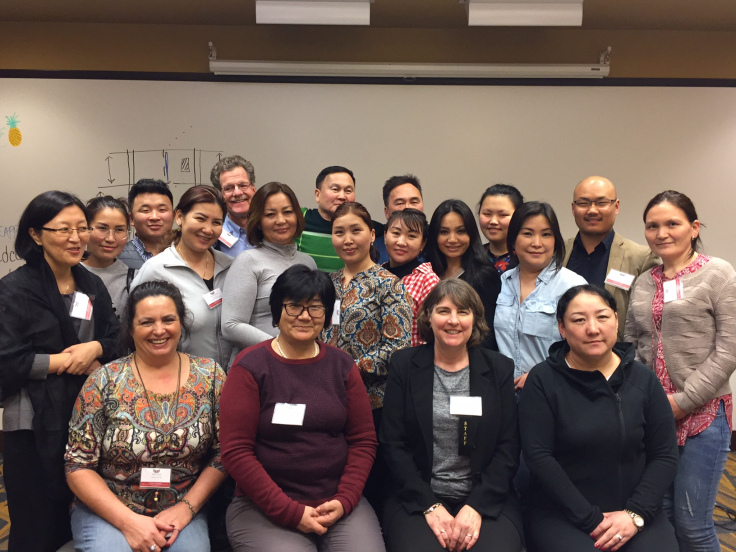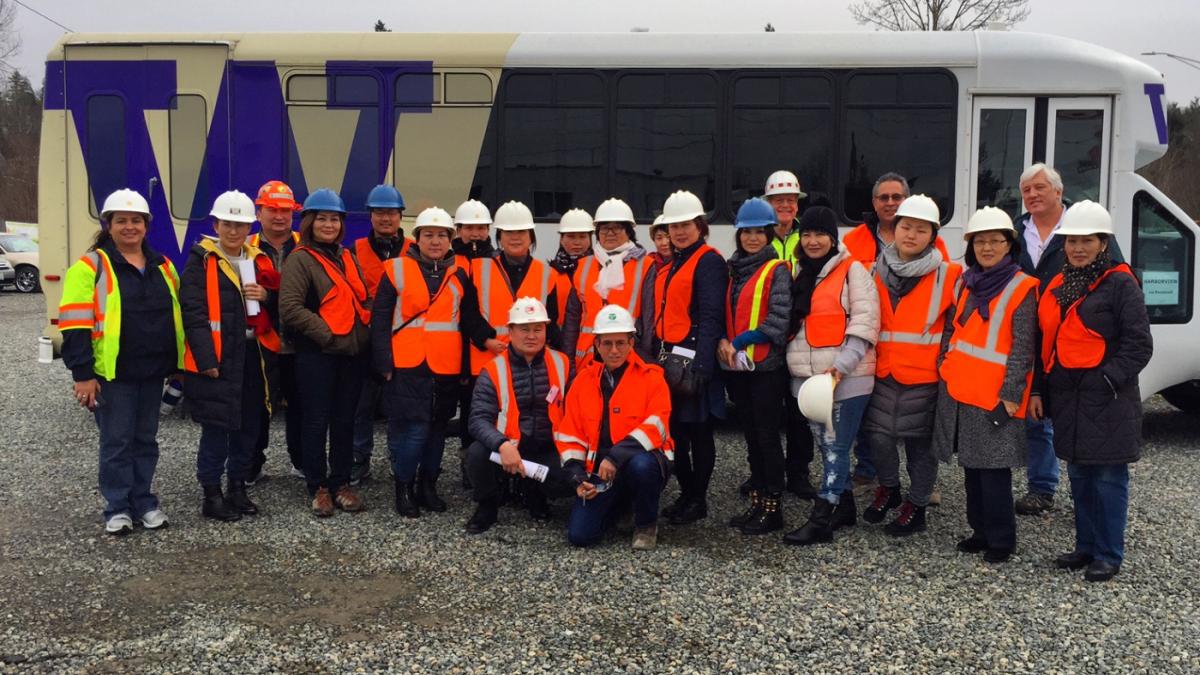
February 2, 2018
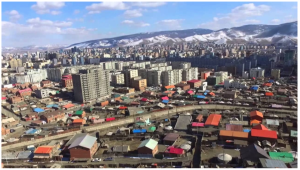 Ground was broken on Mongolia's first highway construction project in May 2016. There are currently no highways in Mongolia, but the country plans to complete 60 kilometers of new highway in the coming year.
Ground was broken on Mongolia's first highway construction project in May 2016. There are currently no highways in Mongolia, but the country plans to complete 60 kilometers of new highway in the coming year.
Mongolia has 49,250 kilometers of roads, only 25% of which are paved. Most of the country's central provinces are connected by single roads, making travel around the country difficult and slow.
With the excitement of the country's new highway construction projects came the harsh reality of the dangerous nature of road construction work. After experiencing worker fatalities and injuries, the Mongolian Labor Union Association decided to make workplace health and safety a major goal and priority.
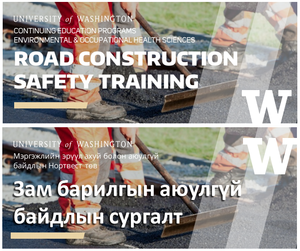 Road construction workers in Mongolia face many of the same health and safety hazards as workers in the United States, such as falls and run over/back over incidents. However, with major road construction projects only taking place within the past two years, Mongolian construction companies and unions are still working to establish best safety and health practices in this new, and rapidly growing, industry.
Road construction workers in Mongolia face many of the same health and safety hazards as workers in the United States, such as falls and run over/back over incidents. However, with major road construction projects only taking place within the past two years, Mongolian construction companies and unions are still working to establish best safety and health practices in this new, and rapidly growing, industry.
As a means to achieve their goal of prioritizing safety, the Federation of Mongolian Road Worker's Trade Unions led by Tserernpurev Batdelger, knew it was time to seek more training from those who have been practicing road construction safety and determining best practices for decades. The union collaborated with Bolormaa Tserendash, at the International Human Development Resources Institute, who has experience coordinating training for Mongolian workers in the United States.
This past week, the UW DEOHS Continuing Education Programs hosted 22 professionals from Mongolia for a special 5-Day Road Construction Safety Training, thanks to Bolormaa and Tserernpurev's efforts and a referral from Work Safe Washington. The group of visitors from Mongolia included a carefully selected delegation of road worker trade union leaders, electrical engineers, educators and safety trainers, radiation professionals, labor economists, social insurance professionals, consultants, and road construction company owners from all across the country of Mongolia.
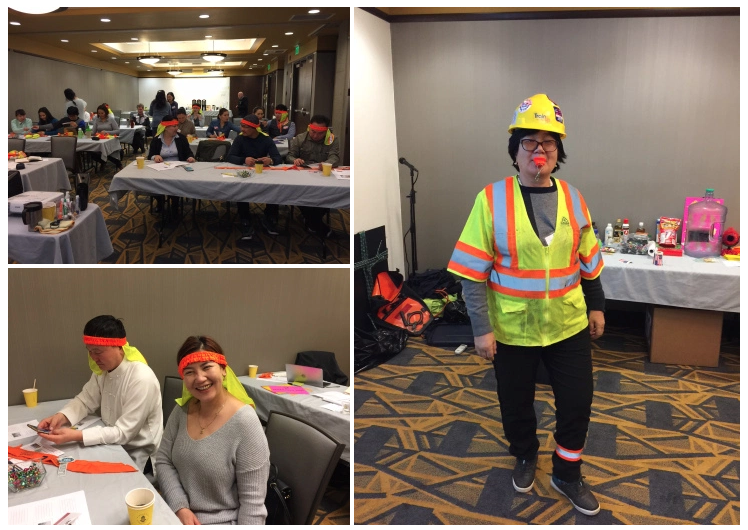
During the first day of training, Robin Smith, ANSI Certified Instructor with Laborers International Union of North America, and Traffic Control Supervisor at Interwest Construction, gave participants a hands-on demonstration of flagging and traffic control best practices. Participants enjoyed the opportunity to don proper PPE and practice their flagging and traffic control skills in interactive exercises. Robin also discussed 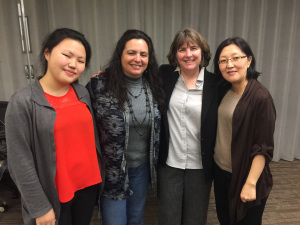 back over/ run over hazard controls, and crash prevention and on-site vehicle safety.
back over/ run over hazard controls, and crash prevention and on-site vehicle safety.
During their first day of training, participants also got a visit from Dr. Ken-Yu Lin, Associate Professor in the UW Department of Construction Management, and head of the Northwest Center for Occupational Health and Safety's new Construction Management Occupational Safety and Health (CMOSH) master's degree program. Ken-Yu gave an overview of the new CMOSH program, which is a collaboration between the Department of Construction Management and DEOHS, and spoke about why incorporating workplace health and safety into construction management is so important.
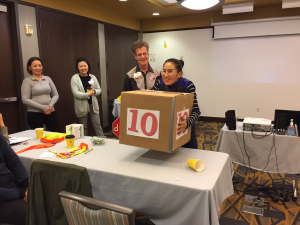 Worker health was the focus of the training's second day. Jay Herzmark, SafeWork Washington, focused on health hazards such as noise and ergonomics during day two, including a hands-on workshop for preventing ergonomic injuries. Ergonomic injuries are a leading cause of days away from work in the United States, and the same can most likely be said for Mongolia!
Worker health was the focus of the training's second day. Jay Herzmark, SafeWork Washington, focused on health hazards such as noise and ergonomics during day two, including a hands-on workshop for preventing ergonomic injuries. Ergonomic injuries are a leading cause of days away from work in the United States, and the same can most likely be said for Mongolia!
After spending two days in the classroom learning about best practices and health hazards, our visiting professionals had the chance to see it all in action during a visit to the Washington State Department of Transportation (WSDOT) I-405/ SR 167 Direct Connector construction site. The WSDOT safety team, lead by Sharif Shaklawun, gave a safety orientation before taking the group out to the site to see best practices in action! Back in the classroom, Doug Buman, Regional Field Coordinator for LIUNA, Tri-Funds sat down with the class to discuss their observations from the WSDOT visit and lessons they could take home to their own job sites.
The exciting week of training concluded with a site visit to a Marpac Construction site. Pacific Northwest OSHA Education Center Lead Instructor, Rick Gleason, demonstrated safety best practices for heavy equipment and cranes using smaller table-top models before taking the group to see the equipment in action on the Marpac job site.
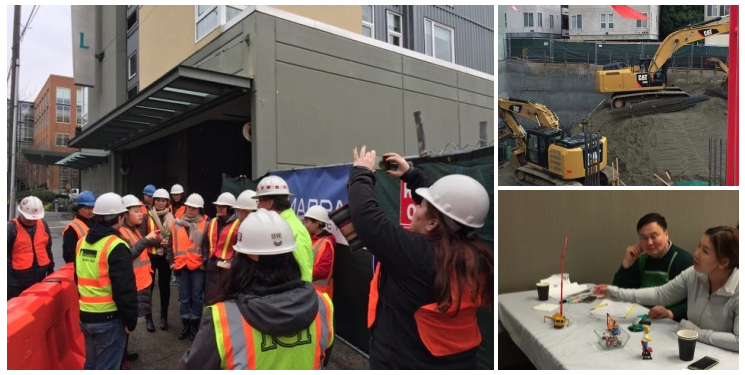
During our send-off dinner celebration our Mongolian visitors expressed their gratitude for the training opportunity with hundreds of homemade Buuz - traditional Mongolian dumplings! Participants shared that visiting America is a dream for many Mongolians, and to have the opportunity to come to America, and learn about workplace safety and health from passionate industry experts, was an irreplaceable experience. With participants coming from all different regions of Mongolia, they will have the opportunity to share what they learned with workers and employers across the country to save lives and prevent injuries and illnesses.
This unique opportunity would not have been possible without the many contributors who dedicated time and passion to this special training event - especially Bolormaa Tserendash, Chair of the International Human Resources Development Institute, and Byambasuren Enkhee, UW Environmental Science student who served as a liaison between the UW and the International Human Resources Development Institute and as the interpreter throughout the 5-day training!
